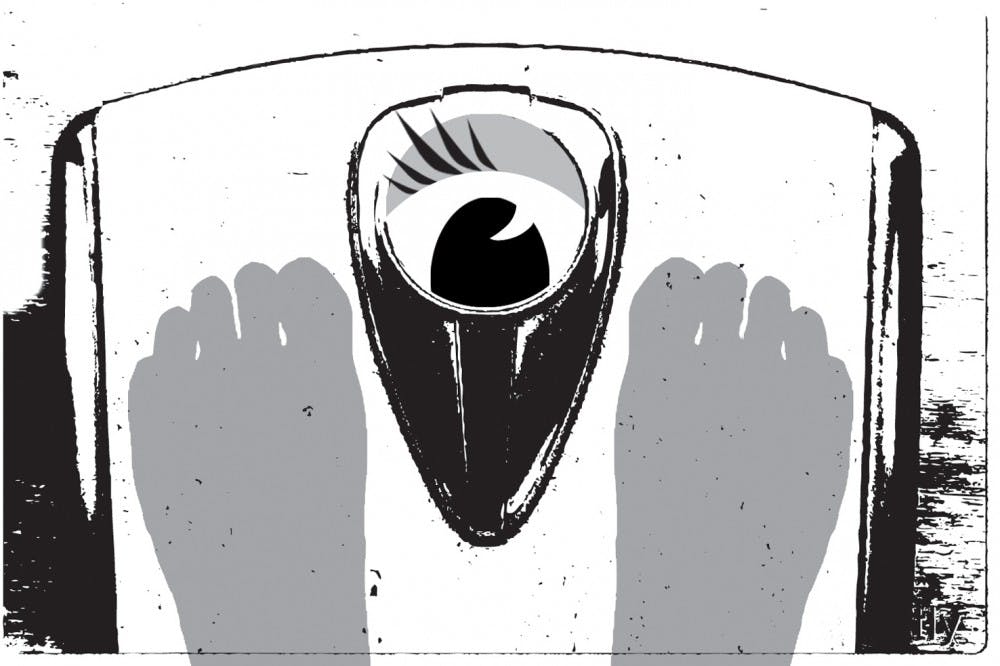"New year, new me!"
I’d be pressed to find someone in America who hasn’t said or heard this phrase in the past two weeks. At the beginning of each year, we see a surge of people dedicated to New Year’s resolutions. The most cliche of these resolutions? To get healthy.
While hundreds flock to the gym and pull out their juice blenders, many don’t realize that in their efforts to get healthy, they’re doing the exact opposite. This yearly fitness frenzy leads many to engage in habits that are considered disordered eating.
Now, having disordered eating habits does not necessarily mean that you have an eating disorder. Eating disorders such as anorexia nervosa and bulimia, are conditions with specific symptoms, and they need to be diagnosed by a medical professional for safe and accurate treatment.
Disordered eating, however, can include habits that our society has normalized. Frequent dieting, food anxiety and rigid diet and exercise routines are all considered types disordered eating. If your focus on food, exercise or body image negatively impacts your mental or physical well-being, these are not healthy lifestyle habits.
A 2018 study of male and female college students explored the correlation between peer norms, body dissatisfaction and disordered eating. It found 8.5 percent of men and 16.1 percent of women showed signs they were at risk for an eating disorder.
The study concluded a positive correlation between body dissatisfaction and disordered eating in both men and women. However, it found a positive correlation between peer norms and body dissatisfaction only in women.
Society has created the idea that fitness is synonymous with thinness and that thinness is synonymous with beauty and worth. Women are often held to these unattainable expectations of beauty and thinness, while men tend to be held to higher expectations of fitness and muscularity.
Regardless of the varying experiences of different genders, many of us can relate to the pressure to look a certain way. Especially today, with constant media exposure to the “ideal body.”
A 2016 study found a positive correlation between mobile phone application use and both disordered eating and compulsive exercise. With all these images and messages in our lives, it’s no wonder many of us are unhappy with the way we look.
What many don’t realize is health looks different on everybody. If you are eating healthy and exercising enough, the way you look is healthy. You do not need to be thin to be healthy. Regardless, your beauty does not depend on your health. Most importantly, you are worthy of compassion and respect no matter your body type.
But don’t throw out your 2019 resolution to get healthy just yet. It’s certainly something that I should strive to do this year. Nearly everyone can benefit from healthier eating and increased exercise.
The Center for Disease Control summarizes a healthy diet as one that is high in fruits, vegetables, whole grains and lean meats, while being low in saturated fats, trans fats, cholesterol, salt and added sugars. Fad diets often limit your nutrition intake and create an unhealthy relationship with food.
According to the CDC, only half of adults reach their recommended amount of exercise each day. Exercise improves aerobic fitness, cognitive function and mental health, while lowering the risk of heart attack, stroke and weight gain.
Excessive exercising becomes especially dangerous when you are obsessively counting or cutting calories. When you exercise, be sure you are fueling your body with enough calories to complete your workout.
At the end of the day, a healthy lifestyle should be about just that — your lifestyle. It should not be about how others perceive you or your appearance. Revise your 2019 New Year’s resolution: get healthy the healthy way.






